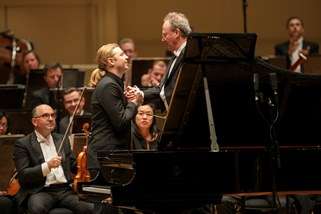|
Back
A Touch of French Elegance Chicago
Orchestra Hall
11/17/2016 - & November 18, 19, 22*, 2016
Franz Liszt: Les Préludes, Symphonic Poem No .3
Sergei Prokofiev: Piano Concerto No. 2 in G Minor, op. 16
Antonín Dvorák: Symphony No. 8 in G Major, op. 88
Denis Kozhukhin (Piano)
Chicago Symphony Orchestra, Emmanuel Krivine (Conductor)

D. Kozhukhin, E. Krivine (© Todd Rosenberg Photography)
French guest conductor Emmanuel Krivine, who will become the Orchestre National de France’s principal conductor starting next season, opened the concert with Liszt’s symphonic poem Les Préludes. It was his way of setting the tone of the evening. The orchestra opened the work with a lyrical sway allowing the music to breathe, continued with a build-up of tension that was released with martial fervour by the trumpets, drums and cymbals with amazing precision. Despite the huge sound generated and the intensity of the brass instruments, this often bombastic piece was a model of structured elegance and clarity.
It is clear that Denis Kozhukhin has true affinity to Prokofiev. The Piano Concerto No. 2 is the composer’s least melodious and least varied in tempi. Except for its finale marked Allegro tempestoso, the piano part in this concerto can easily sound like one very long Andante with minor diversions into faster tempi. The Second Concerto is Prokofiev’s most difficult. It is also Kozhukhin’s favourite, probably for this very reason. He played it with an almost scary ease, but it was not all show off virtuosity. Khozhukhin also played it with an unfamiliar sensitivity. Composed by a 19 years old Prokofiev, it was an enfant terrible’s attempt at shocking a conservative audience. Khozhukhin’s utter virtuosity and Krivine’s mastery rendered this often not so substantial concerto into a thrilling masterpiece.
The second part of the concert was Dvorák’s Symphony No. 8. Often this symphony is interpreted as predictably and annoyingly folkloric. It is true that Dvorák’s Czech nationalism evoked the colours of the homeland, in part in nationalist pride and in part to vex the Austro-German musical establishment. Krivine opted for a different and much more exciting reading. The tempi may have been a bit faster than usual, but this gave a new energetic life to the work that emphasized elegance and beauty of sound. There are no indolent peasants in this reading, but there still is the beauty of nature. It was a show piece for the excellence of orchestra’s various sections, especially the winds. Such an approach of making glorious sound is especially welcome in a hall with marvellous acoustics such as Chicago’s Orchestra Hall.
A wonderful feature recently introduced at the Chicago Symphony is a Questions and Answers session with the artists after the last performance of a concert. (This was the fourth and last performance). Both Denis Kozhukhin and Emmanuel Krivine revealed themselves to be interesting and unusual. When asked how one performance differs from another, the answer was that the final result of a performance is not just how the orchestra plays but also how the public reacts. The public is part of the performance. Asked about his choice of the program, Krivine used culinary comparisons about playing music, considering the disparate choice of works as fusion cuisine and the intermission to be a sorbet between two different courses rather than an interruption. It seemed the French conductor may have been hungry after the performance. More surely, the audience was even more hungry for both artists’ thrilling music making.
Ossama el Naggar
|